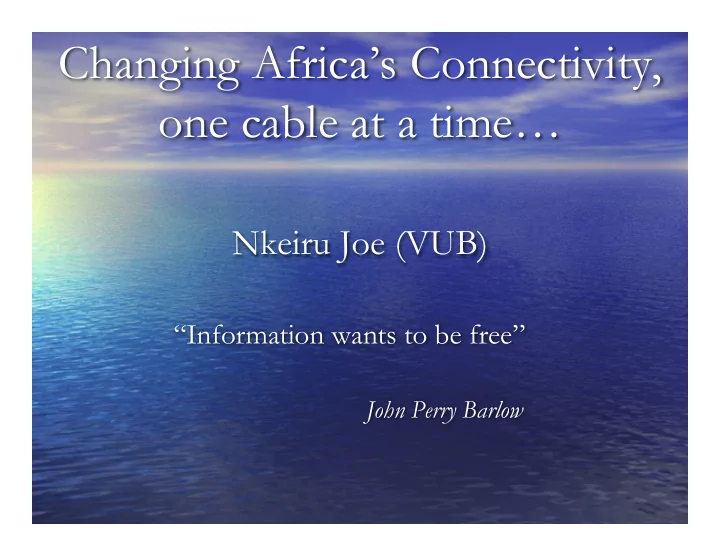

Changing Africa’s Connectivity, one cable at a time… Nkeiru Joe (VUB) “Information wants to be free” John Perry Barlow
Advances, development and Tech transfer with Cables • 1988: First fibre-optic cable that traversed oceans installed • 1991:WWW (Internet users up to 50 Million) • 2009: Cables in East Africa • Possibilities are endless! – fibre-optic submarine cables enables large volumes of voice & data traffic to be rapidly carried around the globe
International Submarine Cables in Africa The benefits of international submarine cables -cost-effective on large trans-oceanic routes -reliable (longer life span) -secure. Plus… Satellite technology can complement the marine cable industry. – Rise in multi data accessibility and usability. – Rise in internet users
Cable specifications www.iscpc.org
Cable Station
Problems: State and Inter-state level • No UN body or specialized agency that deals with submarine cables. • There is no internationally recognised registry of submarine cables. Who has laid what where? • Ownership issues. Mostly owned by private companies. Thus, cables can’t be identified by their State of Registration and there is no “flag State” to protect them under International Law • An ICPC solution?
• ICPC( International Cable Protection Committee) Promoting the safeguarding of submarine cables against man-made and natural hazards by providing a forum for the exchange of technical and legal information pertaining to submarine cable protection methods and programmes. There is an opportunity for co-operation at the state and inter-state level. But as of 22 September 2009, 7 African states are members of the ICPC.
The law Any laws and regulations which require consent or permits for the laying or repair of cables beyond the territorial sea contravenes the object and purpose of the recognised freedom to lay submarine cables and hampers development. But an African focused alternative will be to balance this freedom with preventing abuse of these freedoms therefore…
The End User must inform all levels Symbiosis between states, companies and ultimately the consumer. -Cable companies should give notice to coastal states and right to lay should be allowed to all interested parties. -State-focused governance framework.
The User wins with more companies… • More Competition. More companies. Costs are truly driven down as a result. For Example, -10 companies in UK -14 in the US all registered at ICPC as member organisations.
• The situation today is simply the fact that the geography of internet communication determines the content and quality of your internet experience. Developed/ developing divide. • To the end user the main concern is the connection between real space location of data and data consumers and how efficient this connection is. Thank you !!
Recommend
More recommend